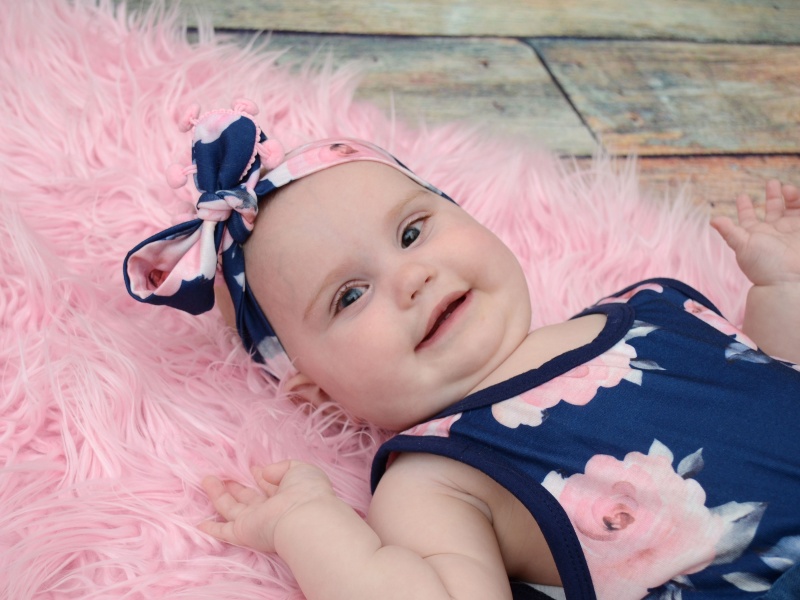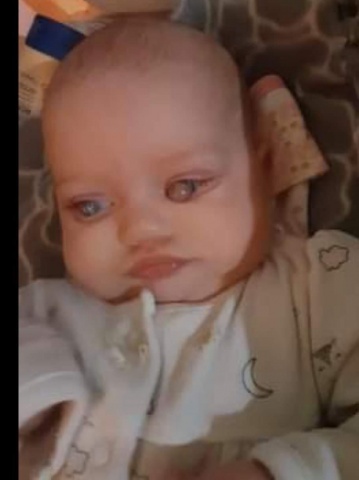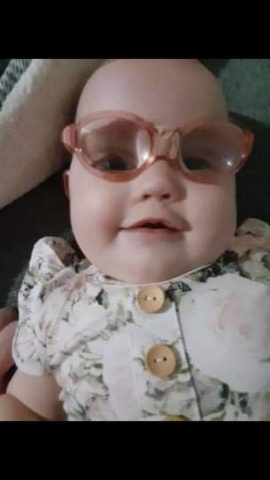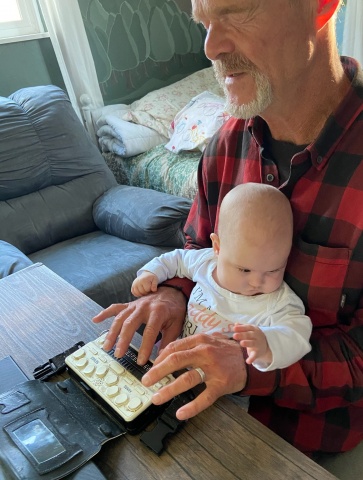
When Emily and Adam from Iowa City welcomed their third child into the world on October 5, 2020, their doctor noticed immediately there was a problem with little Avery’s eyes. They were referred to the University of Iowa Hospitals and Clinics Department of Ophthalmology where Avery was diagnosed with a rare genetic disorder of the eyes called Peter’s anomaly, which caused thinning and clouding of her corneas, along with glaucoma and cataracts. Joyful over the birth of their beautiful daughter, Emily and Adam were now devastated to learn she was blind.

Avery pre-transplant
Hope for sight came three months later when Dr. Mark Greiner performed corneal transplants on each of Avery’s eyes, just one week apart. In a heartfelt letter to the families of Avery’s cornea donors, her grateful parents wrote, “Our three-month-old daughter received a transplant thanks to your gift. It will be a long road, but there is hope she will see. We realize the terrible loss you have suffered to make this gift possible. What you and your loved one have done will leave a lasting mark on the life of our little girl and our whole family. We hope this letter and our sincere gratitude brings you peace.”
Emily shares how thankful she and her husband are for their three healthy children—seven-month-old Avery, two-year-old Mason, and teenage daughter Jordan, age 14: “Avery’s sight is at risk, but her life is not. Seeing the children at the (University of Iowa Stead Family) Children’s Hospital when we are there for appointments, and talking with families of children awaiting heart transplants, we can’t help but think about Avery’s donors and are reminded that we have so much to be grateful for.”
Emily is a nurse in the intensive care unit at Mercy Hospital in Iowa City and Adam works as a maintenance technician for a property management firm in the area, and both are taking classes to further their careers. “Going on walks with the two youngest ones fills any leisure time we have,” states Emily.
Adding to their already busy family schedule, Avery’s post-operative treatment includes three different eye drops that need to be administered four times each day. Avery has also been fitted with pediatric eyewear containing prescription lenses to correct the astigmatism created by her corneal transplants. “Thankfully, Avery is a very happy baby who rarely cries,” stated Emily when asked how Avery tolerates her eyecare regime. “However, she is going through a phase where she will not wear her glasses!”

Avery with prescription protective eyewear
Though Dr. Greiner has informed Emily and Adam that graft rejection or vascular in-growth could jeopardize Avery’s new corneas, he still offers them hope for her sight. Emily confidently says, “We know Avery definitely has vision now; she tracks objects and loves anything that lights up.” She continues, “But knowing that she could lose her vision at any time is a reality we have to face. We want her to be able to live life. She will be taught braille and cane walking and will probably have a guide dog when she is a young adult.”
In a coincidental twist of fate, when Emily was seeking childcare for Avery and her brother Mason, she based her final decision on whom she “liked the most.” As it turned out, according to Emily, “Our daycare provider is legally blind, and her husband has been blind since birth. She is still able to run a small business and has become our beacon of hope as we look toward Avery’s future.”

Avery is content to "learn braille" as her daycare provider's blind husband transcribes voice recordings into braille notations for the visually impaired